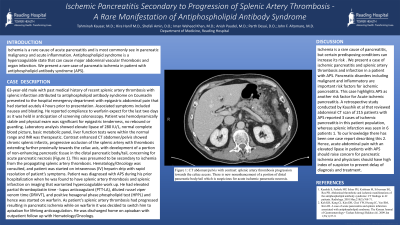Tuesday Poster Session
Category: Biliary/Pancreas
P2915 - Ischemic Pancreatitis Secondary to Progression of Splenic Artery Thrombosis - A Rare Manifestation of Antiphospholipid Antibody Syndrome
Tuesday, October 24, 2023
10:30 AM - 4:00 PM PT
Location: Exhibit Hall

Has Audio

Tahminah Kausar, MD
Reading Hospital Tower Health
Reading, PA
Presenting Author(s)
Hira Hanif, MD1, Shefali Amin, DO, MSEd2, Tahminah Kausar, MD1, Iman Khan, MD1, Anish Paudel, MD3, Parth Desai, DO3, John Altomare, MD1
1Reading Hospital Tower Health, Reading, PA; 2Reading Hospital, Reading, PA; 3Tower Health-Reading Hospital, Reading, PA
Introduction: Ischemic pancreatitis is rare and is most commonly see in pancreatic malignancy. Antiphospholipid antibody syndrome (APS) is a hypercoagulable state that can cause major abdominal vascular thrombosis and organ infarction. We present a rare case of pancreatic ischemia in a patient with APS.
Case Description/Methods: This is a case of a 63-year-old male with past medical history of recent splenic artery thrombosis with splenic infarction attributed to APS on Coumadin presented to the hospital with epigastric abdominal pain that had started acutely 4 hours prior to presentation. Review of systems was negative for fever, vomiting, diarrhea. Patient denied alcohol use. He reported compliance to warfarin expect for the last two days as it was held in anticipation of screening colonoscopy. Physical exam was significant for epigastric tenderness. Laboratory analysis showed elevate lipase of 280 IU/L. Contrast enhanced CT abdomen/pelvis showed chronic splenic infarcts, progressive occlusion of the splenic artery with progression towards the celiac axis, with development of distal pancreatic body/tail necrosis. This was presumed to be secondary to ischemia from the propagating splenic artery thrombosis. Hematology/oncology was consulted, and patient was started on intravenous (IV) heparin drip with rapid resolution of patient’s symptoms. Patient was diagnosed with APS during his prior hospitalization when he was found to have splenic artery thrombosis and splenic infarction on imaging that warranted hypercoagulable work up. He was started on warfarin for APS. As patient’s splenic artery thrombosis had progressed resulting in pancreatic ischemia while on warfarin he was switched to apixaban instead for lifelong anticoagulation.
Discussion: We present a case of ischemic pancreatitis and splenic artery thrombosis and infarction in a patient with APS. This case highlights APS as an uncommon risk factor for Acute ischemic pancreatitis. A retrospective study conducted by kaushik et al that reviewed abdominal CT scan of 215 patients with APS reported 3 cases of ischemic pancreatitis in this patient population, whereas splenic infarction was seen in 6 patients 1. To our knowledge there has been one case report describing this 2. Hence, acute abdominal pain with an elevated lipase in patients with APS should raise concern for pancreatic ischemia and physicians should have high index of suspicion to prevent delay of diagnosis and treatment.

Disclosures:
Hira Hanif, MD1, Shefali Amin, DO, MSEd2, Tahminah Kausar, MD1, Iman Khan, MD1, Anish Paudel, MD3, Parth Desai, DO3, John Altomare, MD1. P2915 - Ischemic Pancreatitis Secondary to Progression of Splenic Artery Thrombosis - A Rare Manifestation of Antiphospholipid Antibody Syndrome, ACG 2023 Annual Scientific Meeting Abstracts. Vancouver, BC, Canada: American College of Gastroenterology.
1Reading Hospital Tower Health, Reading, PA; 2Reading Hospital, Reading, PA; 3Tower Health-Reading Hospital, Reading, PA
Introduction: Ischemic pancreatitis is rare and is most commonly see in pancreatic malignancy. Antiphospholipid antibody syndrome (APS) is a hypercoagulable state that can cause major abdominal vascular thrombosis and organ infarction. We present a rare case of pancreatic ischemia in a patient with APS.
Case Description/Methods: This is a case of a 63-year-old male with past medical history of recent splenic artery thrombosis with splenic infarction attributed to APS on Coumadin presented to the hospital with epigastric abdominal pain that had started acutely 4 hours prior to presentation. Review of systems was negative for fever, vomiting, diarrhea. Patient denied alcohol use. He reported compliance to warfarin expect for the last two days as it was held in anticipation of screening colonoscopy. Physical exam was significant for epigastric tenderness. Laboratory analysis showed elevate lipase of 280 IU/L. Contrast enhanced CT abdomen/pelvis showed chronic splenic infarcts, progressive occlusion of the splenic artery with progression towards the celiac axis, with development of distal pancreatic body/tail necrosis. This was presumed to be secondary to ischemia from the propagating splenic artery thrombosis. Hematology/oncology was consulted, and patient was started on intravenous (IV) heparin drip with rapid resolution of patient’s symptoms. Patient was diagnosed with APS during his prior hospitalization when he was found to have splenic artery thrombosis and splenic infarction on imaging that warranted hypercoagulable work up. He was started on warfarin for APS. As patient’s splenic artery thrombosis had progressed resulting in pancreatic ischemia while on warfarin he was switched to apixaban instead for lifelong anticoagulation.
Discussion: We present a case of ischemic pancreatitis and splenic artery thrombosis and infarction in a patient with APS. This case highlights APS as an uncommon risk factor for Acute ischemic pancreatitis. A retrospective study conducted by kaushik et al that reviewed abdominal CT scan of 215 patients with APS reported 3 cases of ischemic pancreatitis in this patient population, whereas splenic infarction was seen in 6 patients 1. To our knowledge there has been one case report describing this 2. Hence, acute abdominal pain with an elevated lipase in patients with APS should raise concern for pancreatic ischemia and physicians should have high index of suspicion to prevent delay of diagnosis and treatment.

Figure: CT abdomen/pelvis with contrast demonstrating a new focus of pancreatic necrosis
Disclosures:
Hira Hanif indicated no relevant financial relationships.
Shefali Amin indicated no relevant financial relationships.
Tahminah Kausar indicated no relevant financial relationships.
Iman Khan indicated no relevant financial relationships.
Anish Paudel indicated no relevant financial relationships.
Parth Desai indicated no relevant financial relationships.
John Altomare indicated no relevant financial relationships.
Hira Hanif, MD1, Shefali Amin, DO, MSEd2, Tahminah Kausar, MD1, Iman Khan, MD1, Anish Paudel, MD3, Parth Desai, DO3, John Altomare, MD1. P2915 - Ischemic Pancreatitis Secondary to Progression of Splenic Artery Thrombosis - A Rare Manifestation of Antiphospholipid Antibody Syndrome, ACG 2023 Annual Scientific Meeting Abstracts. Vancouver, BC, Canada: American College of Gastroenterology.
